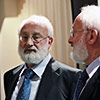

 A person has to understand that his attitude to the group is a mirror in which he sees himself, and this mirror doesn’t lie. While working on Kabbalah circulation, we may even yell at each other from time to time. However, the essence of the matter lies in one’s personal attitude to the friends, which demonstrates one’s more or less correct or totally incorrect approach.
A person has to understand that his attitude to the group is a mirror in which he sees himself, and this mirror doesn’t lie. While working on Kabbalah circulation, we may even yell at each other from time to time. However, the essence of the matter lies in one’s personal attitude to the friends, which demonstrates one’s more or less correct or totally incorrect approach.
Therefore, work with external group externally, and with the inner group internally. This is the order of things.
[30917]
From the 1st part of the Daily Kabbalah Lesson 12/27/10, “What is A Big or Small Sin in the Work”
Related Material:
The Group Beyond The External Veil
The Secret Of The Group
Detach From Everything Else!
 Question: How do I channel my thoughts through the group?
Question: How do I channel my thoughts through the group?
Answer: In order for us to glorify the Creator in our eyes, value Him as a Giver in whom everything is contained, and to ask Him to replace our tendency, our intention, from receiving to bestowal, He has to withdraw, to hide. Otherwise, we will always be egoistically enslaved by His magnificence, His eternal nature, and all that it promises us therewith.
Thus, the Creator is concealed, as if He has nothing. This way, you don’t depend on Him while remaining in the separation. Instead, you can receive His bestowal through the group. He intentionally broke the will to receive (desire) into parts, in order to demonstrate to it what hate, envy, lust, and ambition are, that is, how diverse a desire may be. Thereby, the desire is able to comprehend itself by looking at others.
In truth, the desire wants to simply receive, without being aware of multiple properties and the shades that it possesses. Tell a regular person that he is made of pride, envy, hate, and he will not believe you. Why should he? He doesn’t see them within.
This requires a very long, special development, not in terms of human evolution, but rather in terms of effort aimed at obtaining contact with the Light. Only then does a person begin to understand these notions correctly: not in terms of human psychology but in the exalted [spiritual] terms, in reference to the Light.
In such case, a person finds himself in a special group. He measures himself not against the “people from the street” but against a unique society that yearns for the Creator and is already beginning to absorb spiritual values. He measures envy, lust, ambition, and the degree of his egoism relative to them. This is how a person starts studying himself: who and what he is.
The Creator is concealed and can’t appear to a person since in this case, a person would want to be “pretty” in His eyes, in order to be part of such Greatness. He holds my life in His hands, so can I ever ignore Him if He were revealed?
Hence, the Creator replaces Himself with the group. I stand against the friends, in opposition to them, which gives me an ability to relate to them according to spiritual values. After all, these spiritual values are contrary to me since they belong to the friends whom I hate and reject.
This gives me an opportunity to gain an awareness of evil and to start getting to know myself while standing before the spiritual reality. The group, the environment, reveals spiritual details of perception to me, its properties and values. By rejecting the group, I reject them too. Thereby, I discover the truth.
If I continue on the path, study with the friends, and participate in their actions aimed against my egoistic desire, in order to unify internally, then gradually, I begin to value the states we are undergoing together as well the values we are talking about. In the degree of my demand, I receive the Surrounding Light (Ohr Makif) through the group and start bonding with the friends more and more. While doing so, I discover that it is they among whom I reveal the Light, the Creator.
And everything links into one whole; everything becomes one: the Kli (vessel), the Light, and all of the unifying Kelim. In the end, everything comes into one concept, one attainment.
[30932]
From the 1st part of the Daily Kabbalah Lesson 12/27/10, “What is A Big or Small Sin in the Work”
Related Material:
The Group Beyond The External Veil
Place Of Residence: The Group
The Place Where The Creator Is Revealed
 Question: What is a “flood” for the group?
Question: What is a “flood” for the group?
Answer: If the group as a whole is unable to overcome its increasing desire, if the friends reach hatred and cannot overcome it, it means they are drowning in the waters of the flood.
When they sense the approaching flood and the forces that overcome them (Gevurot), they must put forth mutual efforts to build an Ark, meaning to express mutual bestowal in order to be saved from every person’s individual egoism and the common hatred. That is exactly how the authors of The Book of Zohar sat down to study, feeling hatred for one another, and then revealed love.
Everything depends on whether or not the friends use the Torah as it was intended, whether they build the Ark, the common Kli of mutual bestowal, unity, and mutual guarantee in which they will be saved from the flood.
From the 1st part of the Daily Kabbalah Lesson 12/29/10, Writings of Rabash
Related Material:
How The Zohar Begins
The Zohar: A Funicular To The Creator
How To Tell If You’re Connected
 Dear Friends, please ask questions about these passages from the great Kabbalists. The commentaries in brackets are mine.
Dear Friends, please ask questions about these passages from the great Kabbalists. The commentaries in brackets are mine.
The Essence of the Work in Torah and Mitzvot
By accustoming themselves to keeping Torah and the Mitzvot [actions for the sake of others] in order to bring contentment to their Maker, they gradually depart from the bosom of the natural creation and acquire a second nature, being love of others.
– Baal HaSulam, Matan Torah (The Giving of the Torah), Item 13
The Creator gave us Torah and Mitzvot, which we were commanded to do only in order to bestow contentment upon the Creator. Had it not been for the engagement in Torah and Mitzvot Lishma (for Her Name), to bring contentment to the Creator with them, and not to benefit ourselves, there would have been no tactic in the world that could help us invert our nature.
– Baal HaSulam, “A Speech for the Completion of The Zohar”
[29957]
Related Material:
Kabbalists On The Torah And Commandments, Part 6
Kabbalists On The Torah And Commandments, Part 5
Kabbalists On The Torah And Commandments, Part 4
 Question: If I am always thinking about how to unite with friends while reading The Book of Zohar, then at a specific stage this turns into a “mantra” that repeats by itself and I do not feel the true intention inside me. Should I continue in this manner anyway?
Question: If I am always thinking about how to unite with friends while reading The Book of Zohar, then at a specific stage this turns into a “mantra” that repeats by itself and I do not feel the true intention inside me. Should I continue in this manner anyway?
Answer: The fact that your intention isn’t true is natural. After all, we live inside the will to enjoy; that is our nature. We do not have to lie to ourselves, thinking that we are already angels floating up in the sky.
However, from our current state I am trying to do everything in my power to attain something called the quality of bestowal, as it is written, “We shall do and we shall hear.” You should imagine this quality as much as you can. By making efforts you grow like a child who wants to learn from adults and tries with everything he’s got. That is how we always learn and grow.
From the 2nd part of the Daily Kabbalah Lesson 12/29/10, The Zohar
Related Material:
True Lie
The Elusive Key Component
Go From Being An Observer To A Participant
 My task is to transform my nature. It means that I have to change all my inclinations completely.
My task is to transform my nature. It means that I have to change all my inclinations completely.
I won’t take anything of what I have now with me into spirituality: neither reason nor feelings, nor views, criteria, or calculations. This poses huge, almost insurmountable obstacles in front of intelligent people, and they often fail. One needs to be truly wise in order to abandon one’s own mind.
A smart person believes in his or her logic that works perfectly well in our world, and it’s difficult for him to imagine that it’s powerless on the spiritual path. “Mind, energy, and perseverance are my strong suit. Isn’t that enough?”
Actually, such a person has nothing more than keen intelligence and sensitivity, but here’s the catch: That’s not the currency that buys you a ticket into the spiritual world. There, you need faith. What is it?
Faith is a power that you receive from Above, from the Light. You don’t have it inside you; it’s above your mind and feelings, above who you currently are. An upper influence comes, and you feel like something penetrates inside, awakens in you a consideration which is opposite to everything that you are.
Then, you begin to relate to reality in an inverted way. You used to look at everything through the prism of personal profit. Now, however, you take into account not yourself, but the unity. It’s so strange that it’s indescribable, but, nevertheless, a new consideration forms in you, and you now can’t return to the old one.
Certainly, there are intermediate states, but after a person “exits Egypt,” he comes to a higher consideration, completely abandoning his previous priorities. After all, his intelligence and wealth of feelings, experiences, and reflections just cease to work.
That’s why it is said, “It’s not a wise one who learns.” Typically, success does not favor the brightest minds. Actually, they in particular need a great deal of perseverance and luck to break through into the upper world.
[30784]
From the 1st part of the Daily Kabbalah Lesson 12/26/10, “What is the Extent of Repentance”
Related Material:
Bait For Egoism
What Will I Take With Me?
 Writings of Rabash, “What is the Flood Water in the Work”: Isn’t this contrary to logic? Our inborn nature is the desire to receive pleasure. If we work at something, then we undoubtedly receive a reward for our actions.
Writings of Rabash, “What is the Flood Water in the Work”: Isn’t this contrary to logic? Our inborn nature is the desire to receive pleasure. If we work at something, then we undoubtedly receive a reward for our actions.
Indeed, it is impossible to work without a reward. The Creator wants us to enjoy and be fulfilled. The goal of creation is to give abundance to His creatures, and that means we receive that abundance. Moreover, we have to think about how to receive abundance from the Creator.
The only question is: Inside which Kelim will we receive it? Inside the vessels of reception or the vessels of bestowal?
Reward remains reward. It is written, “The reward for a commandment is to know the One who commands.” We have to know Him just as Adam knew Eve, meaning to attain, understand, and feel Him. The Light of Hochma that we receive is the Light of knowledge that fills all of our Kelim.
We are built in such a way that all of our pleasure comes from knowing the Creator, from reaching unity and adhesion with Him. And that is possible only according to the law of equivalence of form, according to the Light of Hassadim, the quality of bestowal that we will develop inside us above the quality of reception, which ceaselessly appears inside us more and more strongly.
This way, we have all the conditions for building the right Kli and receiving abundance and reward inside it. We should only work with it correctly: We don’t enjoy directly, but from the fact that we attain the Creator, reveal Him, and know Him, as it is written in the Prophets, “Everyone will know Me from the smallest to the greatest.”
We have to understand that our Kelim, our current nature is just a condition from which we have to ascend to the spiritual nature. Then inside our spiritual nature, inside the desires of bestowal, we will receive all of the reward that we hope to get.
From the 1st part of the Daily Kabbalah Lesson 12/29/10, Writings of Rabash
Related Material:
I Labored And Found
A Step Between The Worlds
My Work Is Part Of The Common Work
 Writings of Rabash, “What is the Flood Water in the Work”: We have to take it upon ourselves to believe in the sages….
Writings of Rabash, “What is the Flood Water in the Work”: We have to take it upon ourselves to believe in the sages….
Suppose I am ready to believe the words of wisdom, but what does that mean? Do I understand the words of the sages? What is their message?
First of all, we do not work on bodies in the science of Kabbalah. There are no bodies, but only souls. The bodies that appear before us are images of an illusory world.
I am in a desire that manifests as different forms: still, vegetative, animate, and human. “The sages” are the corrected souls that are in the broken system of Adam HaRishon. They can help me and give me support; they can be my mentors and instructors for my broken soul.
Accordingly, that is how we should accept their advice. For example, The Book of Zohar tells us about ten sages of Rabbi Shimon’s group, as well as the prophet Eliyahu, Moses, Aaron, King David, King Solomon, and so on. We shouldn’t perceive them as people living in our world, but as corrected desires or souls. They are in a broken system, which is gradually starting to be restored back to life. These souls are already corrected, partially or in full, and they participate in the correction of the entire system.
In The Book of Zohar I read things like, “Rabbi Shimon said…Rabbi Abba said….” For me they aren’t people who attain the upper world and tell me about it, but rather, these are names of levels of attainment. Through these words I study the ladder of the spiritual degrees: on one degree reality appears this way and another degree that way. It seems as if Kabbalists are telling me about this, but for me they are actually forces or vessels of perception.
For me every sage represents a spiritual notion, might, force, or quality. I don’t look at the names of historical protagonists, but names of spiritual phenomena and levels. That is the “faith in the sages”: I want to attain the same bestowal as the one that’s present on the degrees that I read about. “Faith” is bestowal.
At the lesson a person has to tune into this and aspire to understand how this will influence him. No matter what the book narrates about, I want to penetrate inside the spiritual essence of every word. This means that I believe the words of the sages.
From the 1st part of the Daily Kabbalah Lesson 12/29/10, Writings of Rabash
Related Material:
Sound Yet Irrelevant Complaints
Kabbalists On Kabbalists, Part 13